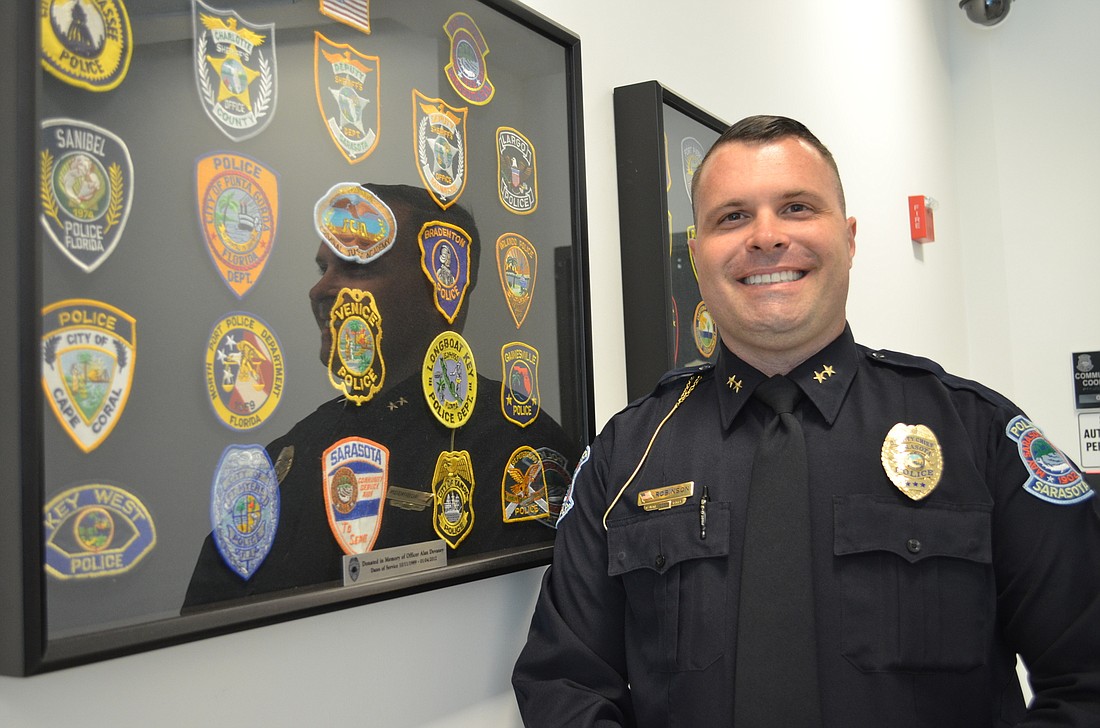- December 15, 2025
-
-
Loading

Loading

In June, the Sarasota Police Department announced its new deputy chief: an internal hire, a 15-year veteran of the force and a Riverview High School graduate. Despite his local roots, Pat Robinson didn’t always dream of taking a leadership position with his local police department, but he found he took to the job quickly.
We sat down with Robinson to discuss his new role, the changing dynamics of the Sarasota Police Department and his appreciation for the team atmosphere the job creates.
How did you end up working with the Sarasota Police Department?
I went to play ball at Holy Cross in Massachusetts. I always knew I was going to come back here, but law enforcement was not something I had in mind. I was a history major, and I thought about going back to get my graduate degree and doctorate to try to teach history. When I got out of college, I found that the job market for history professors was somewhat limited. I ended up actually running into some coaches I had played against at Sarasota High School. They asked me — well, what are you doing? They said, "Why don't you come down apply with the police department? It's a great job, you'll have a good time, great people, it's just like a team atmosphere."
Two weeks later I came in and saw Sgt. Wade McVeigh, who was a coach at Sarasota High School, and he got my paperwork rolling. Two weeks after that, I was in the police academy. I kind of just fell into the police academy, and I'm glad I did. There are very few occupations outside of the public sector where you get to work with such a great group of people.
"The attitude within the department has gone from more of an authoritarian stance to much more of a community-oriented stance."
What’s been the biggest change you’ve seen in the department over the past 15 years?
We went from a time period in which we had tons of resources, and it was very easy to address some of the problems we have in Sarasota by just saying we're going to send this specific unit. As time has progressed and budgets have gotten tighter during the Great Recession, we had to take on this more holistic mentality toward doing our job. A lot of the issues where we would send specialized units are now handled by officers on the road. The evolution of the attitude within the department has gone from more of an authoritarian stance to much more of a community-oriented stance.
What’s your relationship with Chief Bernadette DiPino like?
Now that I've moved up in the rank, it's much more of a mentoring. She definitely is bringing me into her mindset as far as community policing is concerned. She brings a much more aggressive stance with regard to community policing. It’s much more holistic. It’s not just a specialized unit; it’s everybody on the road. We're really trying to be proactive in making sure the officer that works in your neighborhood, you know that person and feel comfortable talking to that person if there is am misunderstanding, so there's not this generalized distrust. Obviously, that is a long-term conversation. We understand that's going to be a generational evolution — it's not something that's going to happen in six months or a year just because you say there's a program in place. It is proving to the community you mean what you say.
Does your history in the city offer you an avenue to help her?
I think that's a good thing — having the knowledge of the community as it's evolved, I think, is always a benefit, because I can provide her a little bit of the historical aspect, or why we do what we do. As I said to the chief the other day, "It's my job to make your job easier." It's not only to make her job easier, but it's my job to ensure the officers have an easier time affecting what she would like to do in the community. I try to sell her message to the captains in a way they understand. I try to take the information from the supervisors and the officers and take them to the chief so she can make informed decisions.
"We've had situations that are just absolutely heartbreaking, and the community expects these guys to absorb that and move forward unflinchingly."
If you could clear up one misconception regarding your line of work, what would it be?
I think we're doing a much better job of humanizing the officers, because, a lot of times, people see the uniform and they don't realize that every single person — they bring everything in their life to this place with them. Just because you put this on doesn’t make you less of an individual. We've had situations that are just absolutely heartbreaking, and the community expects these guys to absorb that and move forward unflinchingly. They have to not only deal with the problems of the community and the horrible things they see — they also have to be a father, mother, sister, brother, etc. We all have good days, and we all have bad days. Folks, oftentimes I think, just see the uniform and they don't realize that I take this off at the end of the day. We all have other things we’re responsible for when we walk out the doors of this police department.